#union sovietica
Text
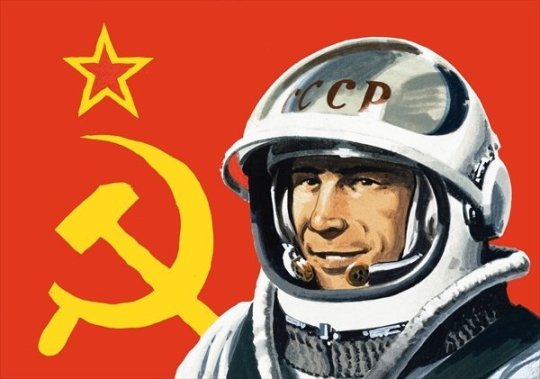
"Ser siempre y en todo como Lenin es lo que me enseñó la familia, la escuela, el komsomol. Ahora prestaba juramento de fidelidad al Pueblo, al Partido, a la Patria, y era como si Lenin escuchara mi promesa de soldado de ser siempre honrado, valeroso y disciplinado".
-Yuri Gagarin
#yuri gagarin#cccp#ussr#urss#soviet poster#soviet union#union sovietica#communists#communist party#communist#communism#marxist#marxismo#marx#karl marx#marxism leninism#marxismo-leninismo#revolución#revolução
8 notes
·
View notes
Photo




Hoy no pude dormir y descubrí a Víktor Tsoi. Aunque de raíces y rasgos asiáticos, de hecho es Soviético de nacimiento, fue una leyenda del movimiento post punk soviético, años 80's. Fue parte de muchas agrupaciones, pero fue con la banda 'Кино' con quienes logró la popularidad en toda Europa, cantaba y escribía en esta banda. Actualmente es una pieza fundamental del culto underground, sobretodo en Madre Rusia. Hay muchos detalles interesantes sobre Víktor que te aseguran que no era alguien normal, un ser sumamente tímido, creativo y único desde niño... aunque creo que el detalle que más me perturbó, es que cuando Víkto falleció en 1990: 65 adolescentes se suicidaron en todo el territorio soviético al saber la triste noticia, 65 almas decidieron partir de esta dimensión e ir junto a su rockstar, su ídolo. Кино se desintegra al perder a su vocalista pero dejan 9 discos llenos de canciones de todo tipo, algunas puramente post punk, es muy lindo escuchar en algunas de sus canciones unas cajas de ritmos tipo Linn y Yamaha, las que actualmente tanto caracterizan a las bandas del revival Post Punk Ruso; otras canciones de Кино son muy raras y random, incluso tienen baladas, pop y experimental, la mente de Víktor Tsoi era muy inquieta como para componer un solo tipo de música. Una de mis canciones favoritas de Кино hasta el momento: В Наших Глазах : https://youtu.be/ktN_MXU5n7Q
#víktor tsoi#viktor tsoi#Кино#Kinó#kino#post punk#soviet post punk#soviet union#union sovietica#post punk 80s#80s#vintage#retro#indie rock
41 notes
·
View notes
Text
Recopa de Europa - 26ta. Edición - 1985/86
https://josenicolascarluccio.blogspot.com/2024/03/recopa-de-europa-26ta-edicion-198586.html
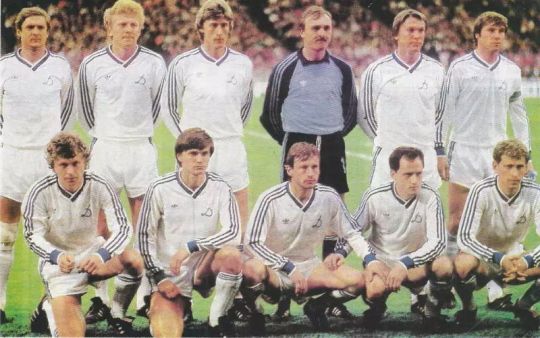
View On WordPress
0 notes
Text

Críptido del día: El pájaro negro de Chernobyl.
Descripción: Según blogs de principios de la década de 2000, quienes trabajaron en la central nuclear de Chernóbil en abril de 1986 informaron haber visto un enorme pájaro negro volando sobre los cielos. A medida que pasaban los días, el pájaro fue descrito como más humanoide e incluso durante la fusión, la gente informó haberlo visto.
#criptido del día#criptidos#criptozoologia#ave negra de chernobyl#kiev#ucrania#rss de ucrania#urrs#union sovietica
1 note
·
View note
Text
Doctrina Truman: los 33 segundos que sellaron el inicio de la Guerra Fría hace 75 años.
Doctrina Truman: los 33 segundos que sellaron el inicio de la Guerra Fría hace 75 años.
En una abarrotada Cámara de Representantes en el Capitolio, el 33º presidente de Estados Unidos, Harry Truman, con sus 62 años, gafas redondas, traje oscuro y corbata a rayas, abrió la carpeta negra de hojas sueltas desde la que le gustaba pronunciar sus discursos.Tomó un sorbo de agua, miró alrededor de la sala a su audiencia y se aferró al podio.“La gravedad de la situación que enfrenta el…

View On WordPress
#eeuu#estados unidos#guerra fria#harry truman#historia#la historia esta viva#union sovietica#urss#usa
0 notes
Text
" Mentre gli oligarchi venivano costretti ad accettare le nuove regole del Cremlino, esistevano nel Paese altri boiari. Erano i governatori degli oblast e dei kraj, potenti notabili eletti localmente che avevano trasformato la loro provincia in un feudo personale e trattenevano per sé, con vari pretesti, il gettito delle imposte locali. Questo federalismo russo risaliva all'epoca di El’cin e Putin attendeva da tempo l’occasione per restaurare il potere centrale. Decise di agire dopo l’attentato alla scuola di Beslan in Ossezia. Fra i due problemi, quello del terrorismo ceceno e quello delle autonomie locali, non esisteva alcuna relazione, ma il presidente russo capì che l’eliminazione dei governatori sarebbe stata più facilmente accettata se decisa in un momento in cui la società russa si sentiva minacciata. Il potere dello Stato russo ha bisogno di un forte consenso popolare, ma il consenso è tanto più forte quanto più il leader, nei momenti cruciali, dimostra di sapere agire con autorità e fermezza. Da allora i governatori sono soltanto prefetti nominati dal governo e, beninteso, scelti dal Cremlino.
L’opinione pubblica approvò la sua politica.
Quelli che rimpiangevano le garanzie del sistema sovietico assistettero con piacere alla decapitazione degli oligarchi e furono lieti di constatare che il governo faceva una politica sociale più generosa e attenta alle loro esigenze. Quelli che temevano il terrorismo islamista e la nuova criminalità videro in Putin un salutare ritorno all'ordine. Mentre la nuova intelligencija deplorava lo stile autoritario del presidente uscito dal Kgb e sognava una democrazia occidentale, la grande massa dei russi salutava con piacere il nuovo Cremlino. La Russia è troppo grande e troppo scarsamente popolata per adattarsi felicemente a un sistema in cui si discute, si litiga, si fanno battaglie civili per la conquista di nuovi diritti e si accetta volentieri, per il gusto della libertà, quel margine di litigiosità e instabilità che è quasi sempre il prezzo della democrazia. La Russia è troppo patriottica e sospettosa del mondo esterno per non apprezzare lo stile di un leader che vuole riconquistare il prestigio del suo Paese nel mondo. Si danno voti a Putin in Russia per la stessa ragione per cui Gorbacëv, il «distruttore dell'Urss», nelle elezioni presidenziali del 1996 ebbe lo 0,52% dei suffragi. "
Sergio Romano, Putin e la ricostruzione della grande Russia, Longanesi, 2016¹. [Libro elettronico]
#Sergio Romano#Vladimir Putin#Russia#leggere#citazioni#Putin e la ricostruzione della grande Russia#saggistica#saggi#democrature#Cecenia#potere#Beslan#Ossezia del Nord#Boris Nikolaevič El'cin#terrorismo#fondamentalismo islamico#autonomie locali#centralismo#Storia della Russia#federalismo#consenso popolare#Cremlino#sovietismo#popolo russo#KGB#Michail Gorbačëv#URSS#Unione Sovietica#XXI secolo#democrazia
12 notes
·
View notes
Text
Armata Rossa: sì o no in base all'evenienza. L'annuale cancellazione della memoria storica.
Da quasi un anno i telegiornali del gruppo Mediaset, e purtroppo non solo, utilizzano sistematicamente l’appellativo “Armata Rossa” per riferirsi alle azioni dell’esercito russo, o almeno, a quello che gli imputano.L’Armata Rossa era l’esercito dell’Unione Sovietica, un paese che non esiste più da 32 anni, diverso per composizione, dimensioni, economia e politica rispetto a quello che è l’attuale…

View On WordPress
#Armata Rossa#Auschwitz#Comunismo#Ebrei#eu#Fascismo#Giorno della Memoria#Nazismo#polonia#red army#sovietici#Storia#Unione Europea#Unione Sovietica
12 notes
·
View notes
Text
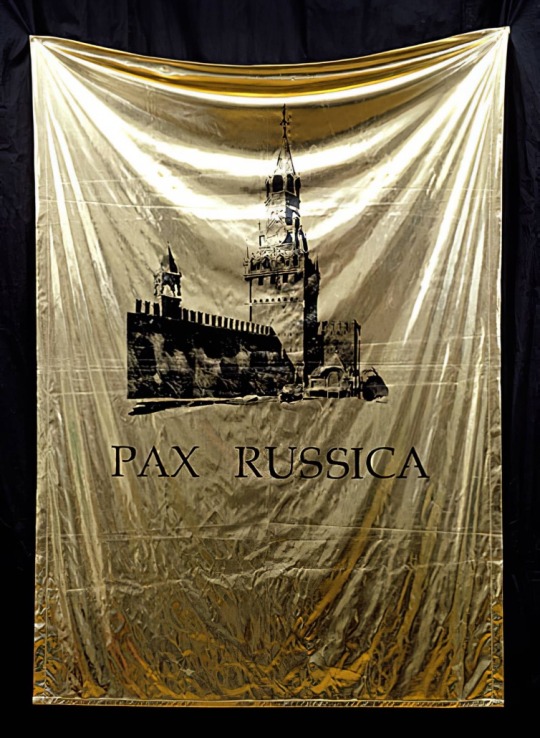
“In the same way, if I abominate tyrants, I nonetheless see that they constitute the warp of history, and that without them the idea or the course of an empire would be inconceivable. Superlatively odious, of an inspired bestiality, they suggest man driven to his limits, the ultimate exasperation of his turpitudes and his virtues. Ivan the Terrible, to cite only the most fascinating among them, exhausts every nook and cranny of psychology: as complex in his madness as in his politics, having made his reign, and to a certain degree his country, into a model nightmare, prototype of a perennial hallucination, a mixture of Mongolia and Byzantium, combining the qualities and the defects of a khan and a basileus, a monster of demoniac rages and sordid dejection, torn between bloodthirstiness and remorse, his joviality enriched with taunts and crowned with sneers, he had a passion for crime; as have we all, insofar as we exist: transgressions against others or ourselves. Only in us it remains unslaked, that passion, so that our works, whatever they may be, derive from our incapacity to kill or to kill ourselves. We do not always acknowledge as much, we are glad to ignore the cozy mechanism of our infirmities. If I am obsessed by the tsars or the Roman emperors, it is because such infirmities, concealed in us, show quite plainly in them. They reveal us to ourselves, they incarnate and illustrate our secrets. I think especially of those who, doomed to an awesome degeneration, turned on their own and, fearing to be loved by them, sent them to their doom. They were powerful, yet they were wretched, unsatiated by the terror of others. Are they not a sort of projection of the evil genius that dwells in us all and tempts us to believe we must leave nothing standing around us? It is with such thoughts and such instincts that an empire is formed: in it cooperates that subsoil of our consciousness in which are hidden our dearest faults.
(…)
Abandoning this corner of the world, the notion of empire would find a providential climate in Russia, where it has always existed, moreover - singularly on the spiritual level. After the fall of Byzantium, Moscow became, for the Orthodox consciousness, the third Rome, heir of the "true" Christianity, the true faith. First messianic awakening. The second had to wait until our own day and age; but that awakening is due, this time, to the resignation of the West. In the fifteenth century, Russia profited by a religious void, as she profits today by a political one. Two major opportunities to absorb her historical responsibilities.
(…)
Russia's claims to turn from vague primacy to distinct hegemony are not unfounded. What would have become of the West if she had not halted and absorbed the Mongol invasion? For over two centuries of humiliation and servitude, Russia was excluded from history, while the Western nations indulged themselves in the luxury of tearing each other to pieces. Had Russia been in a condition to develop unhampered, she would have become a first-rate power on the eve of modern times; what she is now she would have been in the sixteenth or seventeenth century. And the West? Perhaps today the West would be Orthodox, and Rome would enthrone not the Holy See but the Holy Synod. But the Russians can still catch up. If they manage, as there is every reason to expect, to execute their plans, it is not out of the question that they will arrange matters with the sovereign pontiff. Whether in the name of Marxism or of Orthodoxy, they are fated to foil the Church's authority and prestige - they cannot tolerate its aims without abdicating the essential point of their mission and their program. Under the tsars, identifying the Church with an instrument of Antichrist, they offered prayers against it; now, holding it to be a Satanic tool of Reaction, they overwhelm it with invectives rather more effective than their old anathemas; soon they will overcome it with all their weight and all their power. And it is not at all impossible that our age may count among its curiosities, and in the form of a frivolous apocalypse, the disappearance of St. Peter's last successor.
By sanctifying History in order to discredit God, Marxism has merely rendered Him more peculiar and more haunting. You can stifle every impulse in humanity except the need for an Absolute, which will survive the destruction of temples and even the disappearance of religion on earth. The core of the Russian people being religious, they will inevitably gain the upper hand. Reasons of a historical order will have a good deal to do with this triumph.
By adopting Orthodoxy, Russia manifested her desire to stand apart from the West; it was her way of defining herself, from the start. Never, outside certain aristocratic circles, did she let herself be seduced by the Catholic - as it happened, Jesuit - missionaries. A schism does not express the divergencies of doctrine so much as a will to ethnic affirmation: what appears in it is less an abstract controversy than a national reflex. It was not the absurd question of the filioque that divided the churches: Byzantium wanted its total autonomy; Moscow a fortiori. Schisms and heresies are nationalisms in disguise. But whereas the Reformation merely assumed the appearance of a family quarrel, of a scandal within the West, Orthodox particularism, acquiring a more profound character, was to mark a division from the Western world itself. By rejecting Catholicism, Russia delayed her evolution, lost a crucial opportunity for civilizing herself rapidly, while gaining in substance and in unity; her stagnation rendered her different, made her other; this is what she aspired to, doubtless foreseeing that the West would one day regret its head start.
The stronger Russia became, the more aware she grew of her roots, from which, in some sense, Marxism will have alienated her; after a forced cure of universalism, she will re-Russify, in favor of Orthodoxy. And, moreover, she will have stamped Marxism with a distinctly Slavic character: Marxism enSlaved. . . . Any nation of a certain scope that adopts an ideology alien to its traditions will adapt and denature it, inflect it in the direction of its own national des-tiny, distort it to its own advantage, ultimately rendering it indistinguishable from its own genius. A people possesses a necessarily distorting optic all its own, a defect of vision which, far from disconcerting it, flatters and stimulates. . . . The truths it avails itself of, whatever they may lack in objective value, are nonetheless vital and produce, as such, the kinds of errors that constitute the diversity of the historical landscape, granted that the historian - skeptical by métier, temperament, and option - is stationed, from the start, outside of Truth.
While the Western nations exhausted themselves in their struggle for freedom and, still more, in that freedom once acquired (nothing is so wearing as the possession or the abuse of liberty), the Russian people was suffering without self-expenditure; for one expends oneself only in history, and since the Russians were excluded from history, they were obliged to submit to the infallible systems of despotism inflicted upon them: an obscure, vegetative existence which allowed them to gain strength, to accumulate energy, to amass reserves, and to draw from their servitude the maximum of biological advantage. In this, Orthodoxy was a great help - but a popular Orthodoxy, admirably articulated to keep that people apart from the course of events and opposed to the official Orthodoxy which oriented the government toward imperialist aims. The double face of the Orthodox Church: on the one hand it militated in favor of the somnolence of the masses; on the other, as an auxiliary of the tsars, it wakened popular ambitions and made possible enormous conquests in the name of a passive population. Fortunate passivity, which assured the Russians their present predominance, fruit of their historical belatedness. Whether favorable or hostile to them, all of Europe's enterprises hinge on them; once she puts them at the heart of her interests and her anxieties, she acknowledges that they have the potential to dominate her. Thus is virtually realized one of the Russians' oldest dreams. That they have attained it under the auspices of an ideology of foreign provenance adds the spice of a further paradox to their success. What matters, finally, is that the regime be Russian, and entirely in the traditions of the country. Is it not revealing that the Revolution, a direct product of Occidentalist theories, was increasingly oriented toward Slavophile ideas? Moreover, a people represents not so much an aggregate of ideas and theories as of obsessions: those of Russians, whatever their political complexion, are always, if not identical, at least related. A Tchaadaev who found no virtue in his country or a Gogol who mocked it pitilessly was just as attached to it as a Dostoevsky. The most extreme of the Nihilists, Netchaiev, was quite as obsessed by it as Pobiedonostsev, procurator of the Holy Synod and a reactionary through and through. Only this obsession counts. The rest is merely attitude.
For Russia to adapt to a liberal regime, she would have to weaken considerably - her vigor would have to decline; better still: she would have to lose her specific character and denationalize in depth. How would she manage this, with her unbroached internal resources and her thousand years of autocracy? Even if she were to achieve such a thing in one bound, she would instantly disintegrate. Even more than a nation, an empire, if it is to survive and to flourish, requires a certain dose of terror. France herself could invest in democracy only when her springs were beginning to loosen, only when, no longer seeking hegemony, she was preparing to become prudent and respectable. Her First Empire was her final folly. Thereupon, accessible to liberty, she would become painfully accustomed to it, through a number of convulsions, unlike England, which - a bewildering example - had free relations of long standing, without shocks or dangers, thanks to the conformism and the enlightened stupidity of her citizens (the country has not produced, to my knowledge, a single anarchist).
In the long run, time favors the fettered nations which, amassing forces and illusions, live in the future, in hope but what can be hoped for in freedom - or in the regime which incarnates it, constituted of dissipation, serenity, and spinelessness? A marvel that has nothing to offer, democracy is at once a nation's paradise and its tomb. Life has meaning only in democracy, yet she lacks life. . . . Immediate happiness, imminent disaster inconsistency of a regime to which one does not adhere without falling on the horns of an agonizing dilemma.
Better furnished, more fortunate, Russia need not face such problems, absolute power being for her, as Karamzin already remarked, the "very basis of her being." Ever aspiring to freedom without ever attaining it - is this not her great superiority over the West, which, alas! has long since attained to it? Russia, moreover, is not ashamed of her empire; quite the contrary, she dreams only of extending it. Who more than Russia has hastened to profit by the acquisitions of other peoples? The achievements of Peter the Great, even those of the Revolution, participate in an inspired parasitism. And it is true that she endured even the horrors of the Tartar yoke with a certain ingenuity.
(…)
Whether she has provoked or suffered, then, Russia has never been content with mediocre misfortunes. The same will be true of her future: she will fall upon Europe by a physical fatality, by the automatism of her mass, by her superabundant and morbid vitality so propitious to the generation of an empire (in which a nation's megalomania is always materialized), by that health of hers, crammed with the unforeseen, with horrors and enigmas, allocated to the service of a messianic idea, rudiment and prefiguration of all conquests. When the Slavophiles asserted that Russia must save the world, they were employing a euphemism: one hardly saves a world without ruling it. As for a nation, it finds its life-principle in itself or nowhere: how would it be saved by another? Russia still thinks - secularizing the Slavophiles language and their conception - that it is her task to ensure the world's safety, the West's first of all, toward which, moreover, she has never experienced a clear-cut feeling, only attraction and repulsion, and jealousy (that jumble of secret worship and ostensible aversion) inspired by the spectacle of a corruption as enviable as it is dangerous, contact with which is to be sought - but still more to be shunned.
Reluctant to define himself and to accept limits, cultivating ambiguity in politics, in morals, and, more seriously, in geography, with none of the naivetés inherent in "civilized men" rendered opaque to reality by the excesses of a rationalist tradition, the Russian, subtle by intuition as much as by the age-old experience of dissimulation, is perhaps a child historically, but in no case psychologically; whence his complexity as a man of young instincts and old secrets - whence too the contradictions, exacerbated to grotesquerie, of his attitudes. When he decides to be profound (and he succeeds quite effortlessly), he disfigures the slightest fact, the merest idea. It is as if he has the mania of a monumental grimace. Everything is dizzying, dreadful, and ineffable in the history of his ideas, revolutionary or otherwise. He is still an incorrigible amateur of utopias; now, utopia is the grotesque en rose, the need to associate happiness - that is, the improbable - with becoming, and to coerce an optimistic, aerial vision to the point where it rejoins its own source: the very cynicism it sought to combat. In short, a monstrous fantasy.
That Russia is in a position to realize her dream of a universal empire is a likelihood but not a certitude; on the other hand, it is patent that Russia can conquer and annex all Europe, and even that she will proceed to do so, if only to reassure the rest of the world. . . . She is content with so little! Where to find a more convincing proof of modesty, of moderation? The tip of a continent! Meanwhile, she contemplates it with the same eye with which the Mongols regarded China and the Turks Byzantium - with this difference, though, that she has already assimilated a good many Western values, whereas the Tartar and Ottoman hordes had only a wholly material superiority over their future prey. It is doubtless regrettable that Russia has not passed through the Renaissance: all her inequalities derive from that. But with her gift for making up time, she will be, in a century, perhaps in less, as refined, as vulnerable as that post-Renaissance West, at a level of civilization that can be outdone only by descending. History's supreme ambition is to record the variations of this level. Russia's, inferior to that of Europe, can only rise, and Russia with it: which is as much as to say that she is doomed to ascent. By rising, however, does she not risk, unbridled as she is, losing her equilibrium, bursting into ruins? With her millions of souls kneaded by sects and by steppes, she gives a singular impression of space and of claustration, of immensity and of suffocation, of the North in short, but of a special North, one irreducible to our analyses, a North marked by a sleep and a hope that make us tremble, by a night rich in explosions, by a dawn we shall remember. No Mediterranean transparency and gratuitousness in these Hyperboreans whose past, like their present, seems to belong to a different duration from ours. Facing the West's fragility and renown, they experience an embarrassment, the consequence of their belated awakening and of their unemployed vigor: this is the inferiority complex of the strong. . . . They will escape it, they will overcome it. The sole point of light in our future is their nostalgia - so secret and so intense - for a delicate world of deliquescent charms. If they accede to it (as appears to be the obvious direction of their fate) they will be civilized at the expense of their instincts and - delightful prospect - they too will be infected with the virus of liberty.
The more humane an empire becomes, the more readily there develop within it the contradictions by which it will perish. Of composite demeanor, of heterogeneous structure (the converse of a nation, that organic reality), an empire requires, to subsist, the cohesive principle of terror. If it lays itself open to tolerance, that "virtue" will destroy its unity and its power, and will act upon it in the manner of a deadly poison it has administered to itself. This is because tolerance is not only the pseudonym of freedom, but also of mind; and mind, even more deadly to empires than to individuals, erodes them, compromises their solidity, and accelerates their collapse. Hence it is the very instrument an ironic providence employs to destroy them.” - Emil Cioran, ‘History and Utopia’ (1960) [pages 21 - 33]
2 notes
·
View notes
Text


Cosa farò da grande - Misha + Vostok Turbina
#Misha#Olimpiadi#Mosca#Mosca 1980#olympics#Vostok#turbina#Vostok turbina#moscow#Moscow 1980#1980#olimpics games#olimpics games 1980#bear#soviet#cccp#ussr#urss#Unione sovietica#toys#toy#office#soviet russian#pencil#pencil sharpener#orso#memorabilia#soviet era#soviet age#soviet Union
5 notes
·
View notes
Text
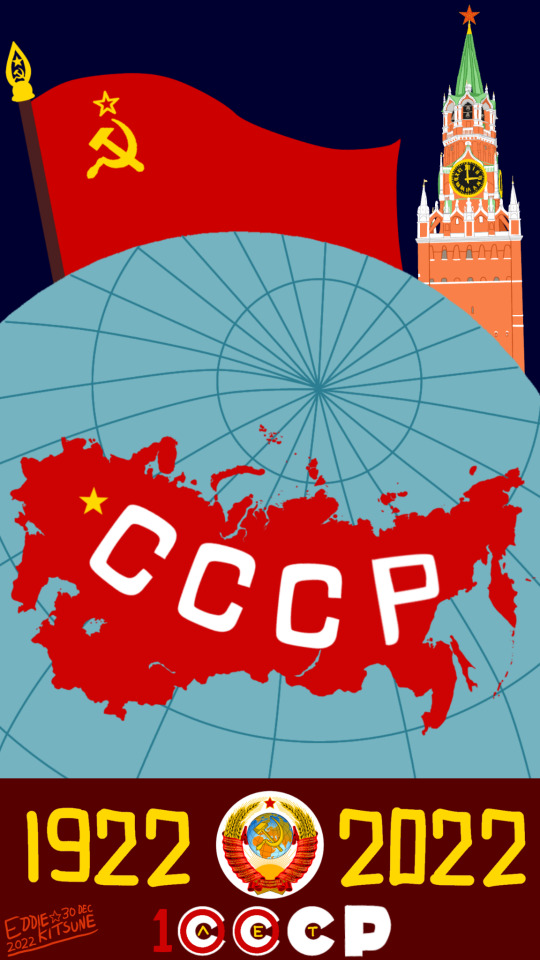
Centennial of the Establishment of the Union of Soviet Socialist Republics
DISCLAIMER: I have no political agenda with this. I simply study the Soviet Union, this is out of pure interest - no more, no less
#my art#digital art#digital illustration#poster#soviet#ussr#ussr (former soviet union)#soviet union#unión soviética#union soviétique#unione sovietica#união soviética#100 years#100th anniversary#establishment#moscow#moscú#kremlin#kremlj
4 notes
·
View notes
Text

[My boy asked me to have a 1917 Russian Revolution-themed birthday party so we made him this cake of comrade Lenin]
[Thanks everyone for your birthday wishes. Nahuel is really happy, the Soviet Union sent us merch]
#SORRY FOR REPOSTING TODAY BUT MY FRIEND SENT ME THIS AND IM LOSING IT#LA UNION SOVIETICA NOS MANDO MERCHANDISING............
9 notes
·
View notes
Text
Cool Sino Soviet Propaganda Images
New Post has been published on https://china-underground.com/2012/01/07/cool-sino-soviet-propaganda-images/
Cool Sino Soviet Propaganda Images
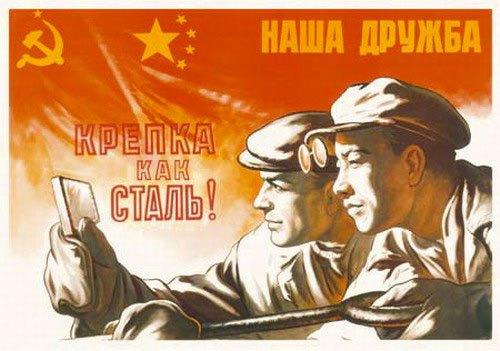
Sino Soviet Propaganda
During the fifties, sino-soviet relations were essentially benign, even if the ideological roots of the Sino-Soviet split originated in the 1940s and started just after the Sino-Soviet Treaty of Friendship and Alliance (1950).
By 1961, the Communist Party of China formally denounced the Soviet variety of Communism as a product of “The Revisionist Traitor Group of Soviet Leadership”. However, before to split, both the propaganda departments stimulated feelings of friendship and cooperation in their respective populations.
Related articles: History of Chinese Space Program, Propaganda Images of the Cultural Revolution
Sino Soviet Propaganda Images
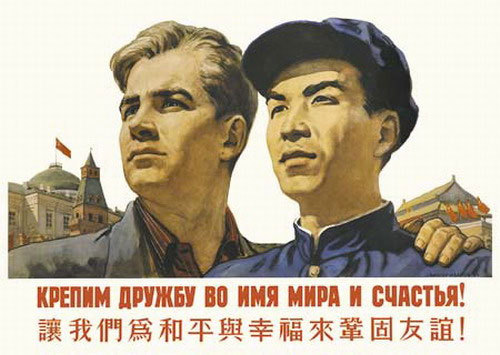
Related
41 propaganda posters for Chinese children
14 Cultural Revolution Propaganda Postcards
Chinese Navy Drills Cultural Revolution Propaganda Images
Source:http://www.cjdby.net/
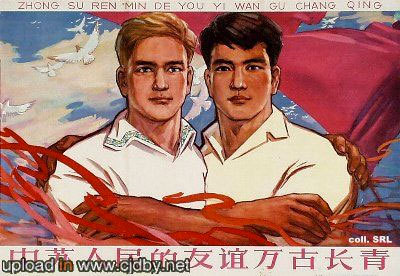
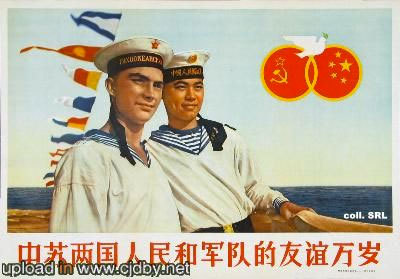
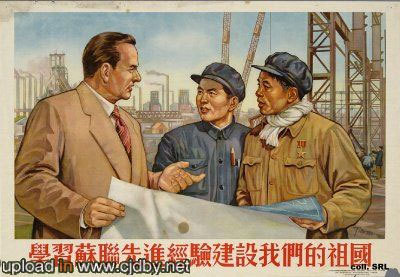
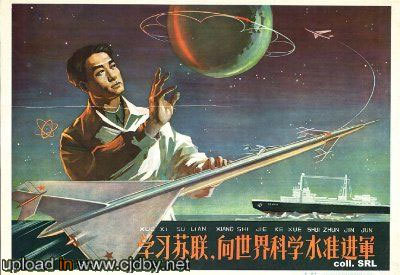

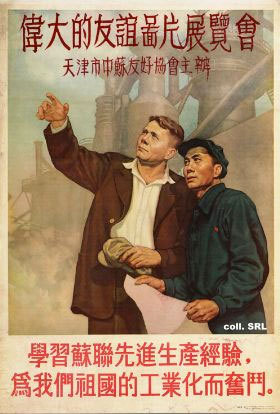
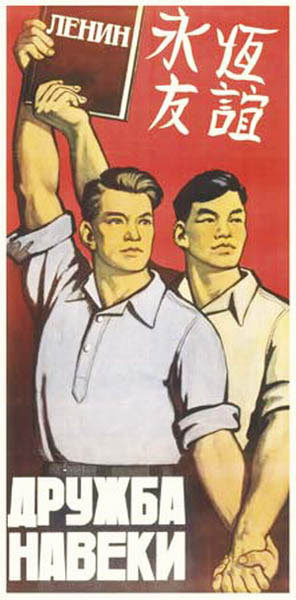


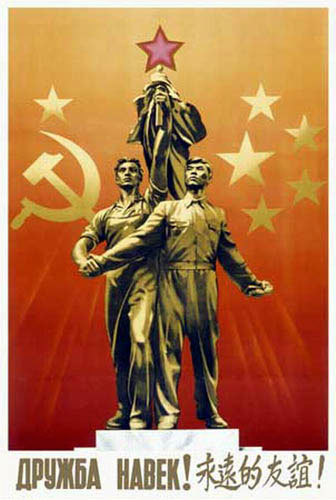




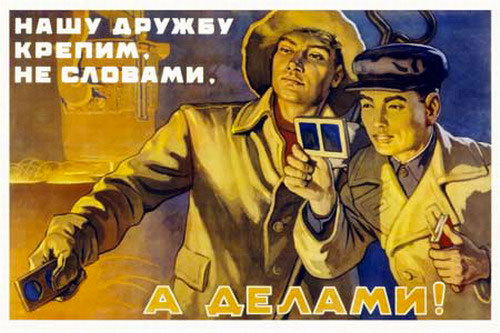

More: Italian Fascist Propaganda Posters
#CCCP, #ChinaSoviet, #ChineseCommunism, #ChineseRussianPropaganda, #CinaSovietica, #Communism, #Images, #Mao, #Propaganda, #PropagandaImages, #RussianCommunismDesign, #SinoSoviet, #SovietUnion, #SovietUnionDesign
#CCCP#China soviet#Chinese communism#chinese russian propaganda#cina sovietica#communism#images#mao#propaganda#propaganda images#Russian communism design#sino-soviet#Soviet Union#Soviet Union design
10 notes
·
View notes
Text
Recopa de Europa - 15ta. Edición - 1974/75
https://josenicolascarluccio.blogspot.com/2023/10/recopa-de-europa-15ta-edicion-197475.html
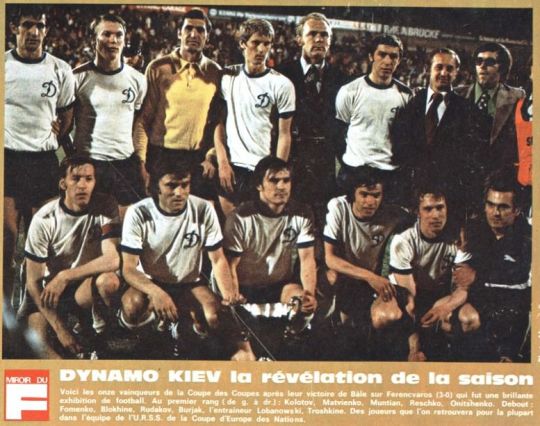
View On WordPress
0 notes
Text
Sputnik 2 was launched on 3 November 1957 and after Laika's death, the spacecraft continued to orbit the Earth until it reentered Earth's atmosphere five months later, on April 14, 1958, and burned up on reentry. ✨
Follow @uncannyfacts for more!
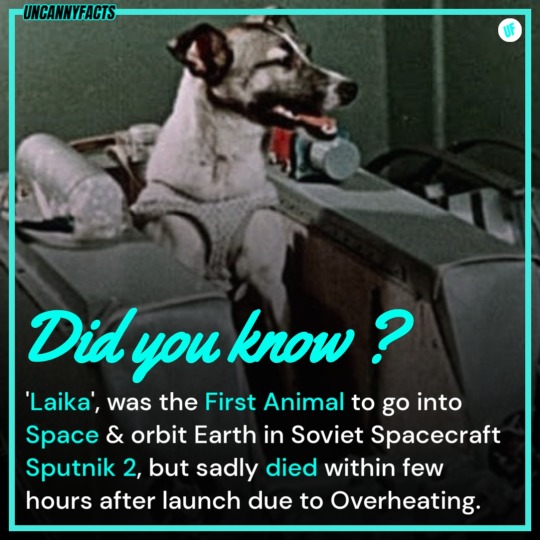


#dogsitting#cute dogs#didyouknowfacts#doggytheworld#safe space#study space#spaceship#soviet russia#unione sovietica#laika#uncannyfacts#uncannyrajan#factsoftheday#uncannymedia#facts#education#amazing facts#weird facts#true facts#history
7 notes
·
View notes
Text
Il mondo piange la scomparsa di Papa Giovanni Paolo II Karol Wojtyła
Città del Vaticano, 2 aprile 2005 – Il mondo è in lutto per la scomparsa di Papa Giovanni Paolo II, il 264º pontefice della Chiesa cattolica, avvenuta questa sera alle ore 21:37 nella sua residenza privata in Vaticano.
Il Papa, che aveva 84 anni, era malato da tempo e le sue condizioni si erano aggravate negli ultimi giorni.
Continue reading Il mondo piange la scomparsa di Papa Giovanni Paolo II…

View On WordPress
#ammirazione#caduta del Muro di Berlino#carisma#Chiesa cattolica#commozione#cordoglio#dialogo interreligioso#dignità della persona#Diritti Umani#evangelizzazione#fede#giustizia sociale#insegnamento magisteriale#Karol Wojtyła#morale#pace#papa francesco#Papa Giovanni Paolo II#pontificato#spiritualità#storia#Unione Sovietica#Vaticano
0 notes
Text
La vera sfida tra USA e URSS in quel contesto non avvenne, infatti, sul fronte ideologico ma sul terreno degli aiuti economici
In un articolo apparso nel 1962 sulla rivista statunitense di ispirazione trotzkista “Partisan Review”, il sociologo Norman Birnbaum scrisse: «Anticommunism, as an intellectually respectable position, is ending» <121. Birnbaum aveva ragione e torto allo stesso tempo. Negli Stati Uniti l’opposizione all’espansione del comunismo e all’Unione Sovietica non stava scomparendo dal dibattito pubblico,…
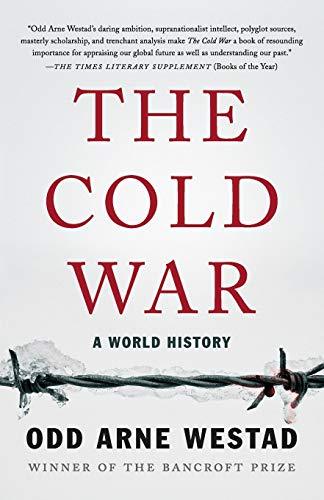
View On WordPress
#1960#Alice Ciulla#America#anticomunismo#colonie#decolonizzazione#economia#ex#ideologia#intellettuali#John Fitzgerald Kennedy#mondo#Sovietica#Stati Uniti#Terzo#Unione#USA
0 notes